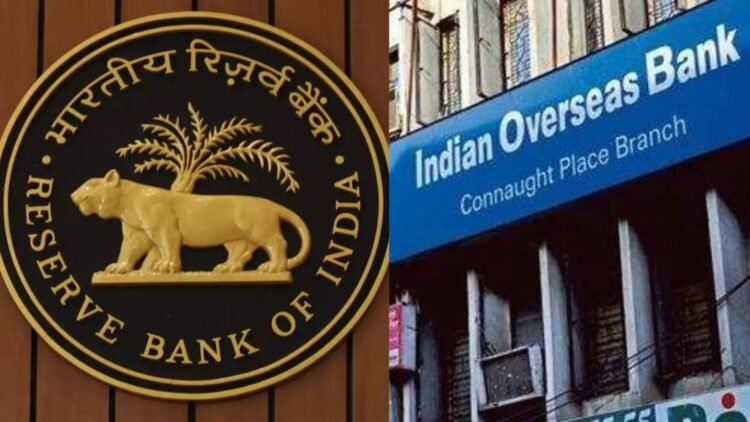NEW DELHI (India CSR): In a decisive move to enforce financial discipline, the Reserve Bank of India (RBI) has levied substantial penalties on two prominent public sector banks—Indian Bank and Indian Overseas Bank (IOB)—for failing to adhere to critical regulatory guidelines. The fines, totaling Rs 1.61 crore for Indian Bank and Rs 63.60 lakh for IOB, underscore the RBI’s commitment to ensuring compliance in areas such as depositor protection, agricultural lending, and support for micro, small, and medium enterprises (MSMEs). This development has sparked discussions about the challenges banks face in aligning with stringent regulations and the steps they are taking to rectify lapses.
| Key Fact | Indian Bank | Indian Overseas Bank (IOB) |
|---|---|---|
| Penalty Amount | Rs 1,61,40,000 (INR 1.61 crore) | Rs 63,60,000 (INR 63.60 lakh) |
| Reason for Penalty | – Non-transfer of eligible amount to Depositor Education and Awareness Fund (DEAF) – Non-compliance with guidelines on: – Interest rates on advances – Kisan Credit Card Scheme – MSME lending | – Non-compliance with guidelines on: – Collateral-free agricultural loans – MSME lending |
| Regulatory Filing Response | Implemented necessary preventive actions to avoid recurrence | Reviewing internal mechanisms to address RBI concerns |
| Date of Announcement | April 28, 2025 | April 28, 2025 |
| Impact Area | Depositor protection, agricultural credit, MSME support | Agricultural credit, MSME support |
| RBI’s Objective | Enforce compliance with financial inclusion and depositor protection guidelines | Ensure adherence to agricultural and MSME lending norms |
Indian Bank’s Rs 1.61 Crore Penalty: A Multi-Faceted Failure
The RBI imposed a penalty of ₹1,61,40,000 on Indian Bank for a series of violations spanning multiple regulatory domains. One key issue was the bank’s failure to transfer eligible amounts to the Depositor Education and Awareness Fund (DEAF) within the stipulated timeframe. The DEAF, established to promote financial literacy and protect depositors, requires banks to transfer unclaimed deposits after a certain period. Indian Bank’s delay in compliance raised concerns about its internal processes for handling dormant accounts.
Additionally, the RBI flagged non-compliance with guidelines on interest rates for advances, the Kisan Credit Card (KCC) Scheme, and lending to the MSME sector. The KCC Scheme is a cornerstone of India’s agricultural credit framework, designed to provide farmers with timely and affordable loans. Similarly, MSME lending is critical for fostering small business growth, a priority area for the government’s economic agenda. Indian Bank acknowledged the lapses in a regulatory filing, emphasizing that it has implemented “necessary preventive actions” to prevent future violations. The bank’s swift response signals its intent to align with RBI’s expectations and restore stakeholder confidence.
Indian Overseas Bank Fined Rs 63.60 Lakh: Agricultural and MSME Lending in Focus
Indian Overseas Bank faced a penalty of ₹63,60,000 for non-compliance with RBI directives on collateral-free agricultural loans and MSME lending. Collateral-free loans are a vital lifeline for small and marginal farmers, enabling them to access credit without the burden of pledging assets. The RBI’s guidelines aim to ensure that banks prioritize such loans to bolster rural economies. IOB’s failure to meet these standards highlighted gaps in its credit disbursement processes.
Like Indian Bank, IOB also faced scrutiny for inadequate support to the MSME sector, which has been grappling with challenges such as rising input costs and market volatility. In its filing, IOB stated that it is reviewing its internal mechanisms to address the RBI’s concerns. The bank’s commitment to corrective measures is a step toward rebuilding trust with regulators and customers alike.
RBI’s Regulatory Oversight: A Broader Context
The penalties on Indian Bank and IOB are part of the RBI’s broader efforts to strengthen governance and accountability in India’s banking sector. In recent years, the central bank has intensified its scrutiny of public and private sector banks to ensure adherence to regulations that safeguard depositors and promote inclusive growth. The DEAF, KCC Scheme, and MSME lending guidelines are not merely procedural requirements but reflect the RBI’s focus on financial inclusion and economic resilience.
Data from the RBI’s annual reports indicates that penalties for non-compliance have risen steadily, with over ₹50 crore imposed on banks in 2024 alone. This trend underscores the central bank’s zero-tolerance approach to regulatory lapses, particularly in areas impacting vulnerable populations like farmers and small entrepreneurs. By holding banks accountable, the RBI aims to foster a banking ecosystem that is both robust and equitable.
Bank Responses and Future Implications
Both Indian Bank and IOB have publicly acknowledged the penalties and committed to addressing the underlying issues. Indian Bank’s proactive stance on implementing preventive measures suggests a focus on enhancing internal controls and staff training. IOB, meanwhile, is likely to prioritize streamlining its loan disbursement processes to align with RBI’s agricultural and MSME lending norms.
For customers and investors, these penalties serve as a reminder of the importance of regulatory compliance in maintaining financial stability. While the fines are unlikely to significantly impact the banks’ financial health, they could prompt greater scrutiny from shareholders and analysts. Moreover, the reputational impact may push both banks to accelerate their compliance efforts to avoid future penalties.
(India CSR)







